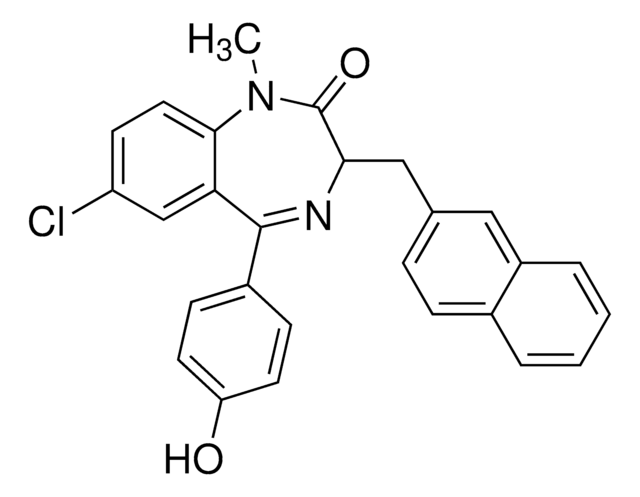495455
Oligomycin
≥90% (mixture of A, B, and C isomers, HPLC), powder, Antibiotic, Calbiochem
Synonym(s):
Oligomycin
About This Item
Recommended Products
product name
Oligomycin, A mixture of A, B, and C isomers.
Quality Level
Assay
≥90% (mixture of A, B, and C isomers, HPLC)
form
powder
manufacturer/tradename
Calbiochem®
storage condition
OK to freeze
color
white
shipped in
ambient
storage temp.
−20°C
InChI
1S/C45H74O11/c1-12-34-17-15-13-14-16-27(4)42(51)44(11,53)43(52)32(9)40(50)31(8)39(49)30(7)38(48)26(3)18-21-37(47)54-41-29(6)35(20-19-34)55-45(33(41)10)23-22-25(2)36(56-45)24-28(5)46/h13-15,17-18,21,25-36,38,40-42,46,48,50-51,53H,12,16,19-20,22-24H2,1-11H3/b14-13+,17-15-,21-18+
InChI key
MNULEGDCPYONBU-ZUSSGZTJSA-N
General description
Biochem/physiol Actions
Membrane-bound mitochondrial ATPase (F1)
Warning
Reconstitution
Other Notes
Amoroso, S., et al. 1993. J. Pharmacol. Exp. Ther.264, 515.
Brustovetsky, N.N., et al. 1993. FEBS Lett.315, 233.
Nagamune, H., et al. 1993. Biochim. Biophys. Acta1141, 231.
Legal Information
Storage Class Code
11 - Combustible Solids
WGK
WGK 3
Flash Point(F)
Not applicable
Flash Point(C)
Not applicable
Certificates of Analysis (COA)
Search for Certificates of Analysis (COA) by entering the products Lot/Batch Number. Lot and Batch Numbers can be found on a product’s label following the words ‘Lot’ or ‘Batch’.
Already Own This Product?
Find documentation for the products that you have recently purchased in the Document Library.
Customers Also Viewed
Our team of scientists has experience in all areas of research including Life Science, Material Science, Chemical Synthesis, Chromatography, Analytical and many others.
Contact Technical Service










